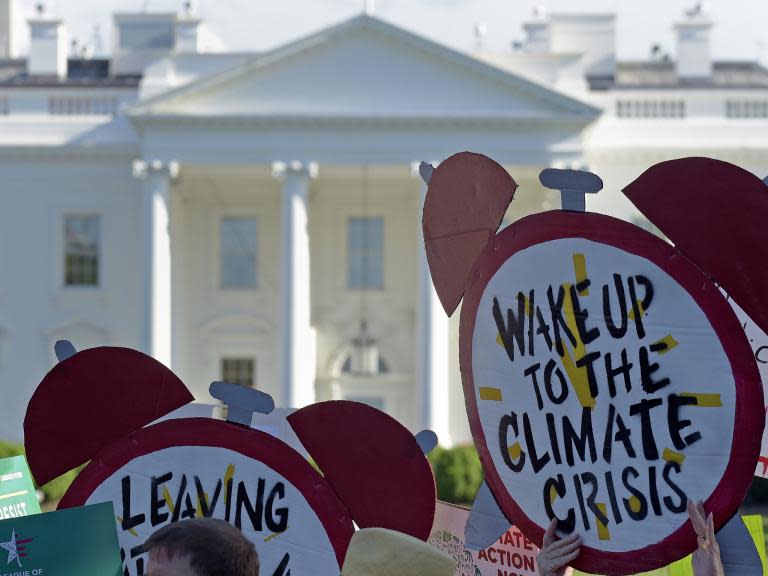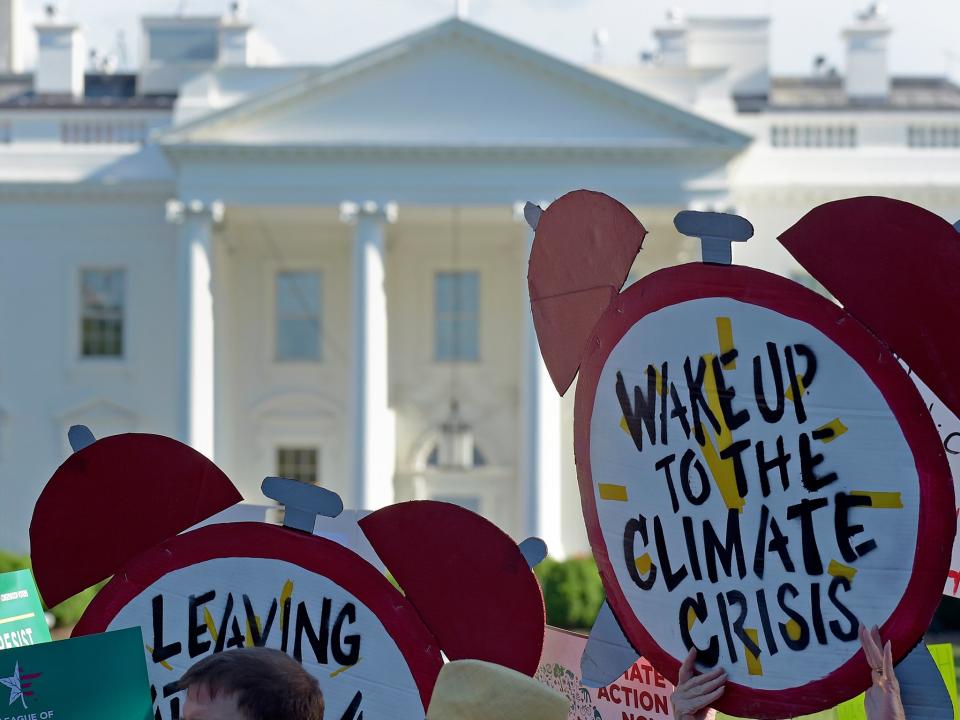House of Representatives backs climate change deal to force US to stay in Paris agreement
The House of Representatives has passed a bill designed to force the US to stay in the Paris climate deal, in a rebuke to Donald Trump who has promised to withdraw from the landmark agreement.
But the Democratic bill, which passed 231-190 in a vote largely along party lines, stands little chance of approval in the Republican-controlled Senate.
House Democrats seized on the measure to portray Republicans as obstacles to progress on climate change – and make a case ahead of the 2020 election that Trump is undermining the nation's commitment to rein in heat-trapping pollution.
Democrats also hope to signal to other countries party to the Paris agreement signed in 2015 that, if the next president is a Democrat, he or she is likely to keep the US in the climate agreement.
“Passing this bill is an important signal to our allies, and my expectation is that when we act we'll see increased ambition from them too,” congresswoman Kathy Castor, lead sponsor of the legislation, told reporters a day before the vote.
Although Mr Trump announced his intent to pull out of the Paris accord after only a few months in office, the earliest he could actually go forward with the withdrawal is November 2020.
“That's an interesting date, isn't it?” Ms Castor said.
The approval of the Climate Action Now Act also constitutes the first time in nearly a decade a major piece of legislation focused on addressing climate change has passed the lower chamber.
It comes after repeated warnings from climate scientists about the perils of inaction when it comes to reducing climate-warming emissions.
Just three Republicans – Vern Buchanan of Florida, Brian Fitzpatrick of Pennsylvania and Elise Stefanik of New York – crossed over to vote with Democrats to pass the bill.
The bill would remove funding for any effort by the federal government to withdraw from the agreement, and would compel Mr Trump to come up with a plan for meeting the United States' Paris targets.
Under the Paris accord, more than 190 nations voluntarily vowed to reduce greenhouse gas emissions with the goal of keeping the globe under 2C warming over pre-industrial levels.
But each nation sets its own emissions-reduction targets under the agreement. Developing countries such as China gave themselves non-binding goals that still allowed them to increase greenhouse-gas emissions for years to come, as the poor in those nations rise out of poverty and increase their energy use.
The differing standards for the United States and its chief economic rival became a bone of contention for Republicans, who raised this issue again ahead of the passage of the bill.
“Climate change is real,” congressman Greg Walden, the top Republican on the House Energy and Commerce Committee, said on the House floor ahead of the vote.
“But addressing climate change should not involve binding ourselves to international agreements that put United States workers and jobs at a disadvantage to our main competitors around the world.”
Since losing the House in November, Mr Walden and other Republicans have instead emphasised investment in new technologies, like advanced nuclear reactors, over regulation and international agreements to reduce the buildup of greenhouse gases.
“We really don't need a Paris climate agreement” to reduce emissions, congressman John Shimkus, the top Republican on the Energy and Commerce subcommittee on climate change and the environment, said during the floor debate.
Ms Castor, an ally of House Speaker Nancy Pelosi, who chairs the House Select Committee on the Climate Crisis, introduced the measure as part of a Democratic effort to reset the climate debate in Congress after the defeat in the Senate of the Green New Deal.
Senate Majority Leader Mitch McConnell forced a vote on the Green New Deal in March in an effort to divide Democrats on the bill that would rapidly reduce carbon emissions over the next decade, all while improving access to jobs and health care.
The Climate Action Now Act is much narrower in its ambitions, but with more than 200 co-sponsors, it affords Democrats an opportunity to show a unified front on the issue of climate change.
And unlike progressive star Alexandria Ocasio-Cortez's Green New Deal, Ms Pelosi and other House leaders backed it.
“This clearly is one of the most, if not the most, important issue confronting our global community,” House Majority Leader Steny Hoyer told reporters on Wednesday.
But Republicans have shown little sign of letting up on their focus of the Green New Deal specifically, with congressman Jody Hice filing a discharge petition on Wednesday that would force a vote on the resolution.
Although the Green New Deal resolution itself is short on details about how exactly to reduce emissions from the power, agricultural and transportation sectors, Republicans across the Capitol decided to fill in the gaps themselves and suggested it would result in bans on hamburgers and air travel.
The Washington Post


